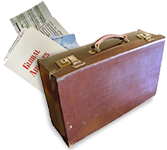A spate of recent news articles point to the growing inevitability of a domino set of mergers — Northwest and Delta, immediately followed by United and Continental. The only thing that seems to be holding up the first domino is who gets to be CEO of the new DeltaNorWest.
While these deals may or may not be winners for the shareholders and the employees, they are typically disasters for customers, especially frequent travelers. Airlines are notoriously complex beasts. Merging fleets, union seniority lists, hubs, and reservation systems is an inexact science at best — as the recent USAir-America West and American-TWA mergers demonstrated.
There’s been a lot of arm-waving by the carriers, especially United, about the need to “rationalize domestic capacity” even though seat utilization — the number of seats filled with travelers — in 2007 was at an all-time high. The real driver behind these mergers is increased pricing power. An airplane seat is a commodity. A carrier can only raise prices if everyone else goes along. If just one airline doesn’t follow the rest in raising prices, everybody has to back down. Taking out two carriers — moving toward an oligopoly — makes it much easier to manage market pricing.
What keeps the US market from deteriorating into an oligopoly? New airlines — companies like JetBlue, Virgin America, and Skybus — and access to airports — gates, landing slots, aircraft parking spaces. Even when carriers like United have been reducing domestic capacity, they’ve been loath to release gates at their hub airports. The FAA has had a decade-long program to “Reduce Barriers to Entry and Enhance Competitive Access”. Reading through the most recent report issued in September 2006, airports like Nashville and Oakland have restructured gate leases to make space for new airlines. But, airports like LAX, which used long-term gate leases to finance terminal improvements, are in a tougher spot. Some gate battle escalate — US Airways threatened to cancel its new Philadelphia-China route if Philadelphia Airport let Delta move their gates to a better terminal.
The algebra for frequent travelers is pretty simple — more available gates equals more new airlines, which equals lower fares and better schedule selection. Add a hot meal to that and you have travel nirvana. How to get to this equation? Let the dinosaurs consummate their deals — but at a price. They need to share the “1 + 1 = 1½” benefits of consolidation — the “deal synergies” — with their customers. As they “rationalize” (reduce) capacity, costs, routes and employees, they shouldn’t need two airlines’ worth of gates and landing slots. Force them to make space for the new airlines. And not just in places that already have space, like Nashville and Oakland, but in places that need new entrants — LAX, Chicago O’Hare, New York La Guardia, and Washington Reagan.
